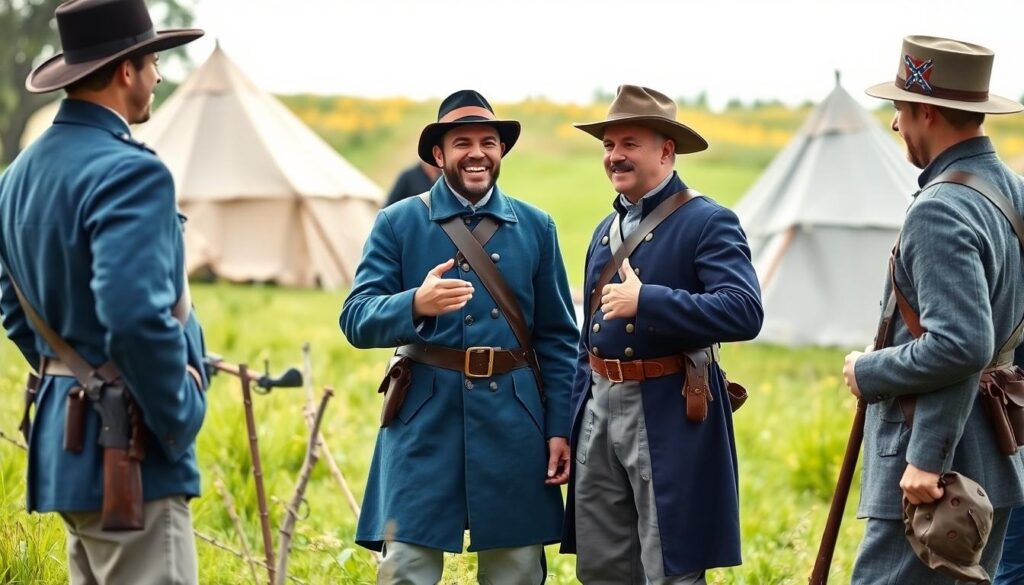Looking for a little historical humor? We’ve gathered some of the funniest Civil War jokes and puns that’ll have you laughing while learning about this pivotal time in American history. From Abraham Lincoln one-liners to battlefield wordplay, our collection strikes the perfect balance between education and entertainment.
We understand that humor about serious historical events requires a delicate touch. That’s why we’ve carefully selected jokes that respect the significance of the Civil War while still finding appropriate moments of levity. These witty remarks and clever puns aren’t just funny—they’re also conversation starters that might spark interest in exploring this fascinating period further.
10 Historically Hilarious Civil War Jokes and Puns
- Why did the Confederate soldier bring a ladder to battle? Because he heard the war was going to reach new heights! This playful wordplay connects to the escalating nature of the conflict while staying lighthearted.
- What’s a Civil War soldier’s favorite type of math? Division! The pun works on multiple levels, referencing both the mathematical concept and the divided nation during the 1861-1865 conflict.
- How did Abraham Lincoln stay so well-informed during the war? He kept his ear to the Telegraph! Communication technology played a crucial role during the Civil War, with Lincoln frequently visiting the War Department’s telegraph office.
- Why couldn’t the Confederacy use their cannons? They were having artillery problems! This pun plays on “heart-illery” problems while referencing actual Civil War weaponry.
- What did General Grant say when asked about his battle strategy? “I’m taking this fight one Shot at a time!” This wordplay references both military tactics and the popular drinking joke about Ulysses S. Grant.
- Why did the soldier carry butter into battle? To have a spread formation! Military formations were essential tactics during Civil War battles, making this pun historically relevant.
- How do Civil War reenactors stay in shape? They do Rebel-utions! This play on “revolutions” and “Rebels” connects to the Confederate forces’ nickname while keeping things light.
- What’s a Confederate ghost’s favorite dessert? Boo-berry pie from the Mason-Dixon line! This combines supernatural humor with the famous boundary between North and South.
- Why was the Civil War document so hard to fold? It had too many Union wrinkles! This pun plays on the complexity of Union politics while using common paper terminology.
When North Meets South: Battle-Ready One-Liners
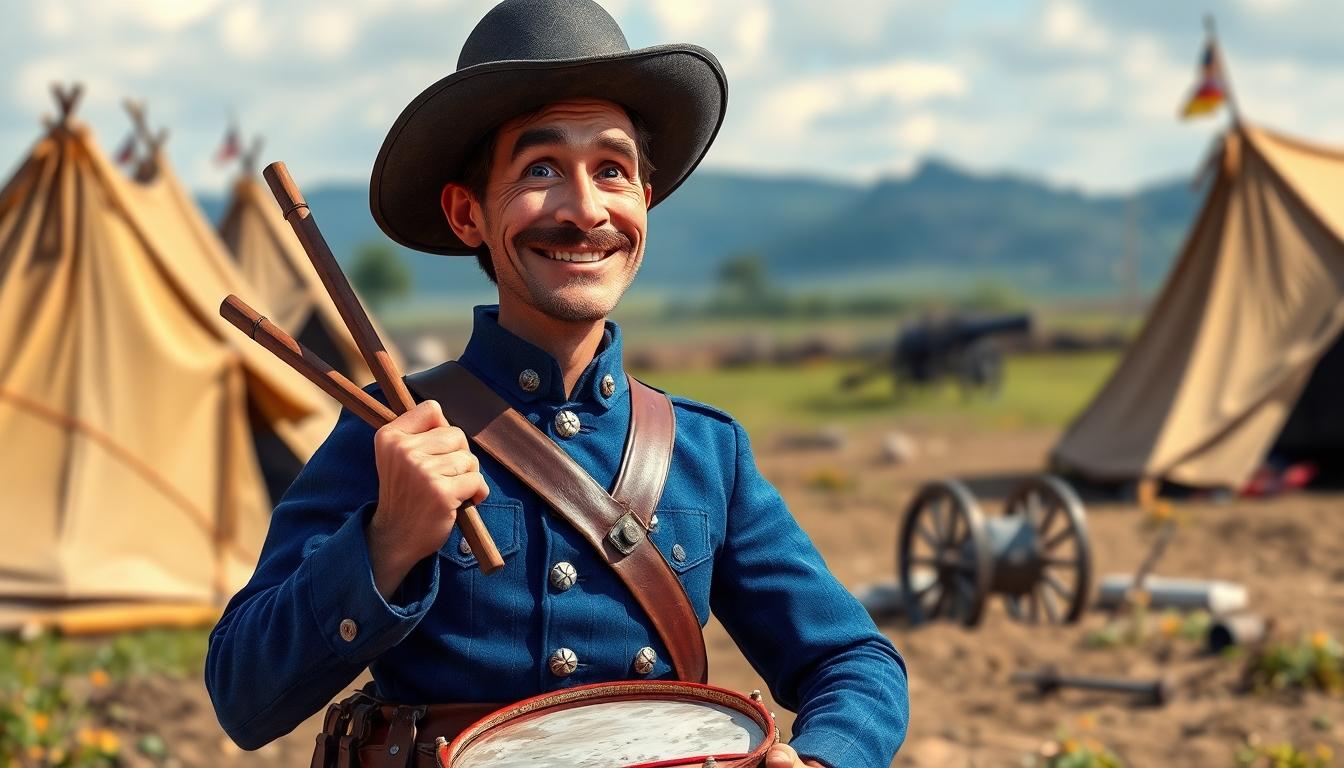
Civil War humor often played on the geographic and political divides that defined this turbulent period in American history. These witty one-liners capture the essence of North-South rivalries while keeping things lighthearted.
Union vs. Confederate Wordplay
The regional identities of Union and Confederate soldiers became prime targets for clever wordplay during the Civil War. Soldiers would joke about their “Union suits” being their favorite clothing, creating a dual meaning that referenced both their military allegiance and a popular undergarment of the era. Dining experiences weren’t exempt from humor either, with a general in a restaurant commonly referred to as a “waiter for history” – perfectly capturing the anticipation of military leadership during pivotal moments. Food disagreements between opposing forces were cleverly termed “beef history” – a playful pun connecting culinary preferences to the broader conflict dividing the nation.
Some jokes directly addressed the political foundations of the war. Consider the popular riddle: “Why did the Confederate soldier lose the race?” The answer, “He seceded too soon,” cleverly references the South’s secession that triggered the conflict. Troops often avoided writing letters home to prevent “drafting” unnecessary drama – a pun that works on multiple levels by referencing both military conscription and letter writing.
General-ly Funny Military Puns
Military terminology provided fertile ground for Civil War era humor. Drummer boys would claim they brought two sticks to battle to “beat the odds” – a statement that acknowledged both their musical duties and the dangerous circumstances they faced. Cannonballs were personified in jokes, with soldiers imagining them lamenting, “I’m tired of destruction—put me in a bowling league!” This humanized the weapons of war while creating unexpected humor.
The Union’s military strategy was often summarized humorously as “divide, conquer, and complain about the weather,” highlighting both tactical objectives and the universal soldier experience of dealing with environmental conditions. Writing implements became weapons in verbal sparring, with soldiers joking about using pencils to “draw their weapons” – creating wordplay between sketching and preparing for battle.
These jokes appeared frequently in Civil War-era newspapers, providing comic relief during intensely difficult times. The humor created bonds between soldiers while acknowledging the harsh realities they faced daily on the battlefield.
Abraham Lincoln’s Legacy: Presidential Punchlines
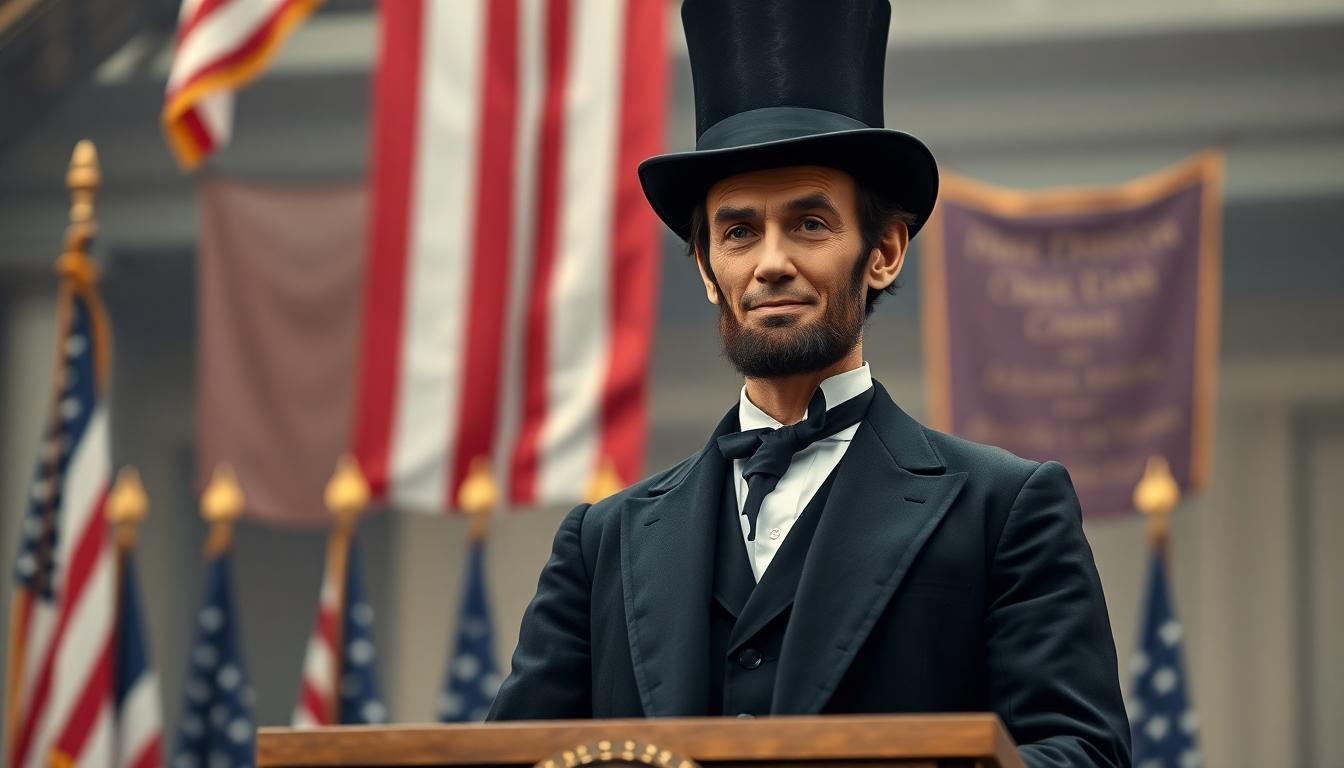
Abraham Lincoln’s reputation for wit extended far beyond his political achievements. While not all of his humorous remarks have been preserved in historical records, Lincoln’s clever wordplay and storytelling abilities remain an integral part of his enduring legacy.
Honest Abe’s Imaginary Zingers
Lincoln’s authentic humor often took the form of strategic storytelling rather than the quick one-liners we associate with modern comedy. Historical documentation shows he frequently used humor to deflect criticism and simplify complex political issues for his audiences. Rather than delivering punchline-driven jokes, Lincoln preferred reframing political debates through accessible metaphors that resonated with everyday Americans. Unfortunately, many quotes attributed to Lincoln today are apocryphal inventions of modern times—such as the famous “Don’t believe everything you read on the internet” quip that obviously couldn’t have originated with him. The genuine examples we have demonstrate Lincoln’s skill at using folksy charm combined with shrewd political insight to connect with people across different backgrounds and educational levels.
Top Hat Humor
Lincoln’s iconic top hat became a recognizable symbol of his presidency, though historical jokes focused more on the man than his famous headwear. His distinctive appearance—particularly his considerable height—often became the subject of his self-deprecating humor. Lincoln masterfully juxtaposed his humble origins with his political position, creating a relatable persona that endeared him to many Americans. Historical accounts reveal Lincoln frequently outwitted political rivals through clever wordplay that caught them off guard. His storytelling approach allowed him to communicate complex ideas in accessible ways, using familiar scenarios to illustrate political points without the direct setup-punchline structure common in today’s humor. Lincoln’s ability to lighten tense situations with appropriate humor served him well throughout the challenging Civil War years, helping him maintain perspective during America’s darkest chapter.
Battlefield Banter: Military Mishaps and Wordplay
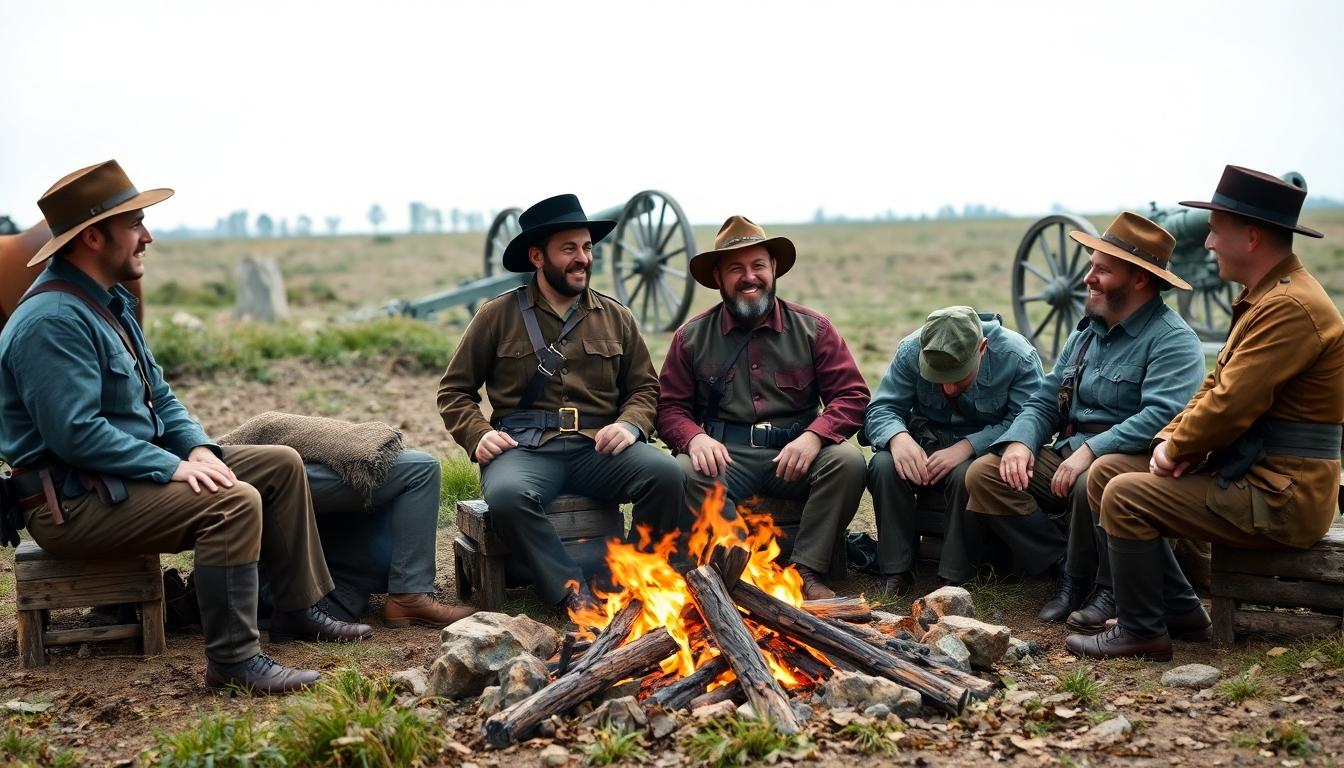
Civil War humor frequently relied on clever puns and situational irony to help soldiers cope with the grim realities of battle. Both sides used wordplay to find moments of levity amid conflict, with newspapers spreading these jokes to wider audiences.
Cavalry Comedy
Horseback warriors were prime targets for humor during the Civil War, with many jokes centering on equine mishaps and riding skills. Though exact examples are limited in historical records, period newspapers likely featured jokes about cavalry retreats and horsemanship blunders. The term “Iron Horses” for trains actually confused many contemporaries, creating unintentional humor as soldiers tried to grasp new technology while fighting old-style battles. Modern interpretations of cavalry humor include gems like: “Why did the Confederate soldier lose the race? He seceded too soon” – a perfect blend of historical context with slapstick comedy that plays on the South’s early withdrawal from the Union.
Artillery Amusement
Cannonball jokes provided explosive laughs during the Civil War era, often using creative wordplay to lighten the mood around these deadly projectiles. One surviving example anthropomorphizes munitions: “A cannonball wanted to join a bowling league,” creating humor by giving human attributes to weapons of war. Artillerymen’s daily struggles inspired many quips about battlefield conditions, such as “The Union’s strategy: complain about the weather,” highlighting how soldiers used humor to cope with discomfort. The “Great Coffee Debate” between Union and Confederate troops became a source of jokes across battle lines, with each side claiming superiority in brewing techniques while sharing a common love for caffeine. Newspapers of the time printed satirical jabs like “pretended patriots hold anything except their tongues,” cleverly critiquing the hypocritical rhetoric that sometimes accompanied war fervor.
Civil War Weapons That Pack a Punny Punch
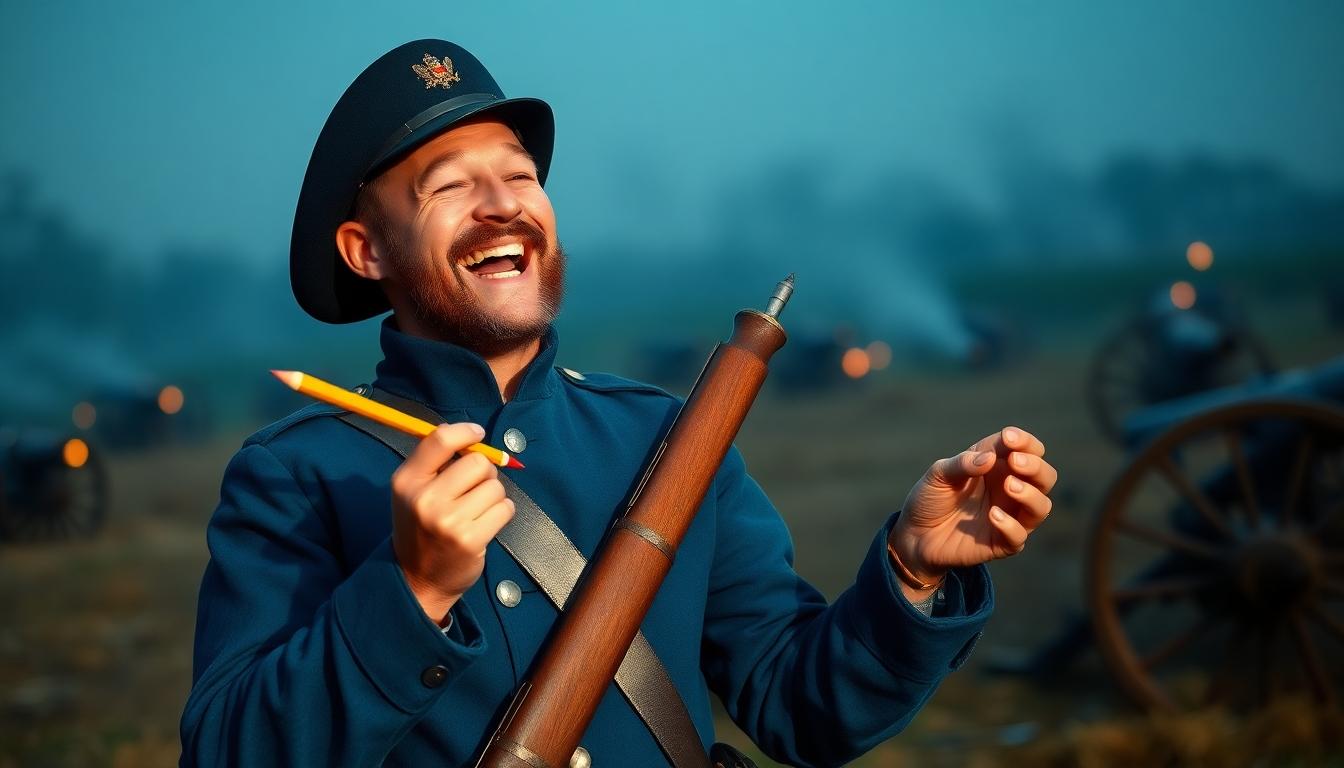
The Civil War era wasn’t just about battles and politics—it also generated some weapons-grade humor. Soldiers often used wit to cope with the harsh realities of war, and their military equipment became prime targets for jokes and puns.
Musket Miscellany
Muskets were essential tools for Civil War soldiers, but they also loaded up plenty of humor. Troops would joke about drawing their weapons, literally bringing pencils to battle instead of firearms. One popular quip asked, “Why did the soldier take a pencil to the battle?” with the punchline “To draw his weapons!” These wordplays helped lighten the mood during tense situations on the battlefield. Union soldiers often joked about their equipment malfunctions, finding humor in the frustrating reality that their weapons were sometimes as unpredictable as the war itself.
Cannon Quips
Artillery provided booming inspiration for Civil War humor. Soldiers developed a special relationship with cannons, often anthropomorphizing these destructive weapons to make their deadly purpose more manageable psychologically. When cannon fire interrupted stretcher bearers, one wounded soldier demonstrated both humor and survival instinct by leaping up and running for cover—a story that circulated widely among troops. Though exact cannon jokes from the era are limited in historical records, we know that soldiers frequently joked about explosive situations, with humor serving as a coping mechanism during artillery bombardments. The thunderous power of these weapons created natural opportunities for wordplay about “making an impact” or “having a blast” during battle.
Historical Figures Who Would Have Killed at Comedy
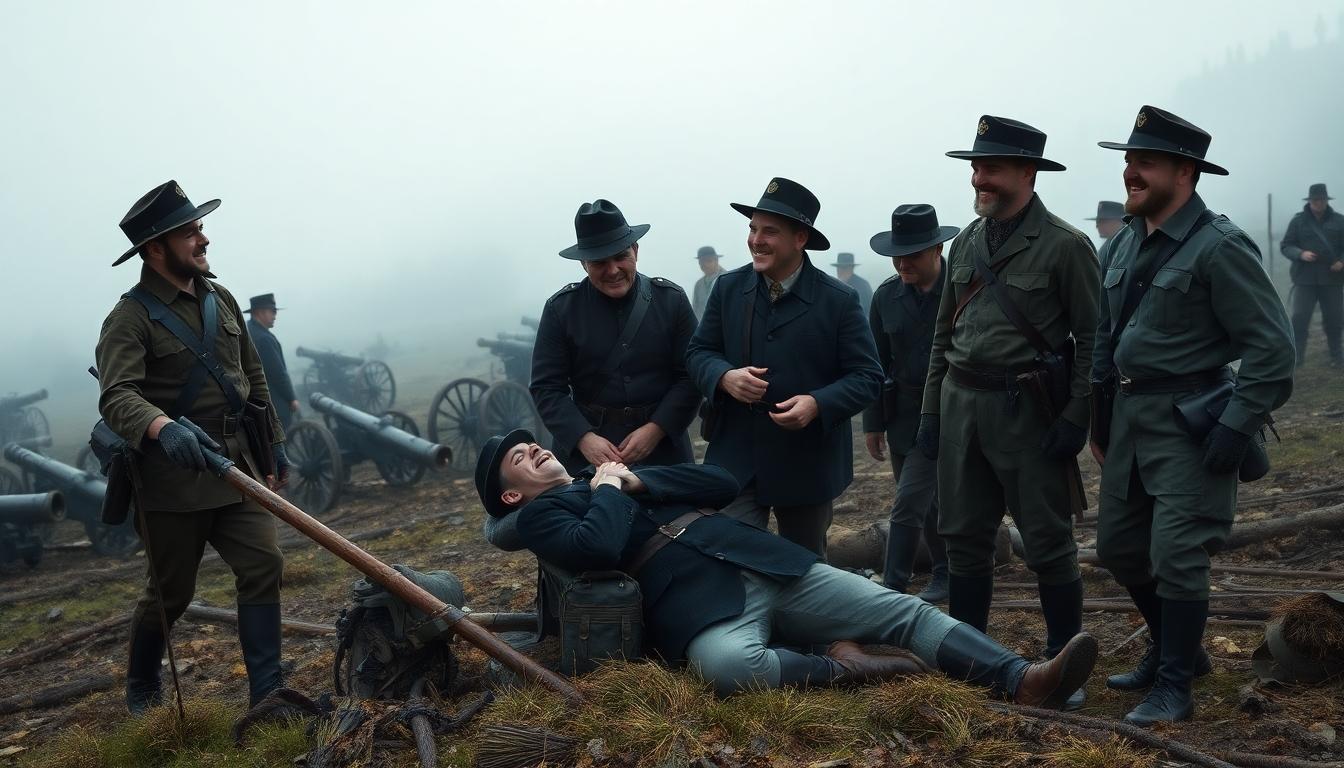
The Civil War wasn’t exactly a laughing matter, but several key historical figures showed remarkable wit that might have made them comedy stars in another life. These leaders used humor to navigate the darkest chapter in American history, often lightening the mood for troops and colleagues alike.
Abraham Lincoln: The Presidential Jokester
Abraham Lincoln stands out as perhaps the most naturally funny president in American history. During the tense Civil War years, Lincoln frequently used humor as a coping mechanism, famously stating, “If I did not laugh, I would surely cry” when questioned about his lighthearted demeanor during such serious times. His storytelling abilities were legendary, utilizing accessible metaphors to explain complex political issues rather than relying on quick one-liners. Lincoln’s self-deprecating style allowed him to connect with people from all backgrounds while simultaneously disarming political opponents with his wit. When criticized for his jokes during the war, Lincoln responded with profound insight: “If I could not laugh, I would surely die.”
Grant’s Groaners
General Ulysses S. Grant, while known for his stoic leadership, became the subject of many jokes focusing on his famously stern demeanor. One popular quip suggested that “the Civil War was a battle of wills, but someone should have told General Grant to chill.” Grant’s serious nature and occasional fondness for whiskey provided ample material for wartime humor. Soldiers often joked about his unwavering determination, creating puns that played on his name and reputation for being unflinching in the face of adversity. Though not known as a comedian himself, Grant’s distinctive personality traits made him an unintentional comedy icon of the era.
Lee’s Laughable Lines
Robert E. Lee, commanding the Confederate forces, maintained a dignified persona that ironically became fodder for humor. While Lee himself wasn’t known for cracking jokes, his formal manner and military precision inspired many quips among both Confederate and Union troops. Soldiers sometimes parodied his precise battle orders and ceremonious style in camp performances. Lee’s impeccable appearance and rigid adherence to military protocol contrasted sharply with the often chaotic nature of war, creating natural comedic tension. Though few recorded jokes are directly attributed to Lee himself, his leadership style and serious demeanor would have provided excellent material for period comedians looking to lighten the mood during dark times.
Soldiers’ Battlefield Humor
Beyond the famous generals, ordinary soldiers embraced gallows humor to cope with the horrors of war. One memorable anecdote involves two stretcher bearers who spotted a “wounded” soldier suddenly leaping up and running away from approaching cannon fire. They humorously exclaimed, “Ain’t God great. He can cure soldiers even before we can get them to the hospital!” This type of situational comedy flourished among troops facing daily danger. Civil War newspapers further contributed to maintaining morale by publishing humorous columns featuring wordplay, puns, and satirical observations about military life. These publications recognized that even during history’s darkest moments, laughter provided essential relief for both soldiers and civilians handling the unprecedented national crisis.
Civil War Reenactment Humor: When History Repeats Itself
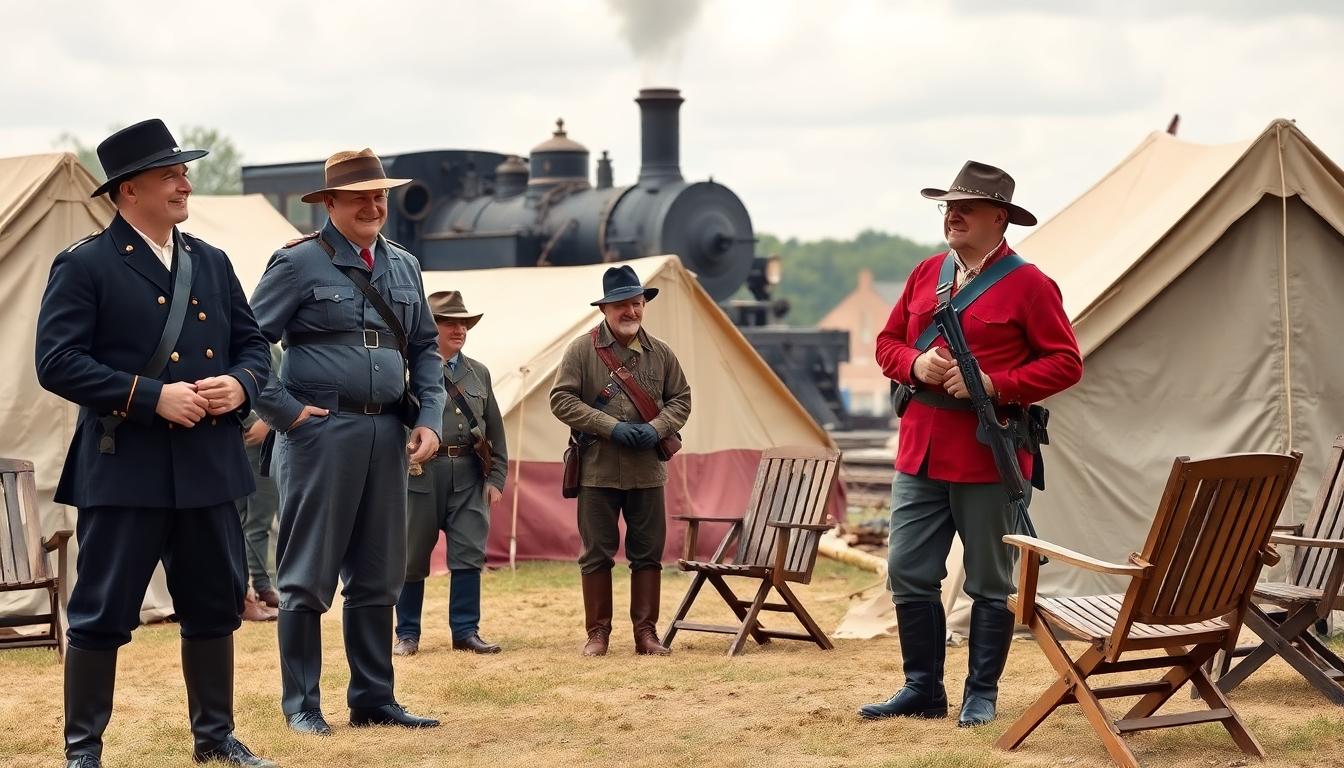
Civil War reenactments bring history to life, but they also create plenty of opportunities for humor as modern-day history buffs navigate the challenges of 19th-century life.
Costume Comedy
Reenactors constantly battle with period-accurate attire, creating endless comedic moments. Union suits (those infamous one-piece undergarments) and scratchy wool uniforms generate regular laughs when participants discover just how uncomfortable 1860s fashion truly was. Costume malfunctions provide reliable comedy gold, with misplaced buttons, tangled hoop skirts, and wayward suspenders leading to quips like “Did they issue a manual for these suspenders?” Many reenactors find themselves joking about accidental anachronisms when modern conveniences accidentally make appearances during events, highlighting the stark differences between 19th-century and contemporary clothing expectations.
Camp Life Chuckles
The reenacted military camp setting breeds its own unique brand of humor centered around misinterpreted orders and historical faux pas. Soldiers often playfully confuse “Iron Horses” (steam locomotives) with actual horses, creating exaggerated scenes of confusion that entertain spectators. Modern reenactors have perfected the art of period-appropriate complaints, delivering lines like “Sure, the train’s late—just like McClellan!” to reference the notoriously cautious Union general. Units regularly engage in mock rivalries over resources, with jokes about “surrendering coffee beans” to enemy camps becoming a staple of reenactment humor. These camp life jokes serve dual purposes—entertaining participants while subtly educating visitors about authentic daily struggles faced by Civil War soldiers.
Battlefield Banter
Puns dominate battlefield humor, with classics like “Why did the soldier bring a pencil? To draw his weapons” keeping spirits high during long reenactment days. Creative wordplay such as “What’s a general in a restaurant? A waiter for history” demonstrates how reenactors blend historical knowledge with modern wit. Participants playing casualties might occasionally break character with jokes like “I’m not wounded—just avoiding KP duty!” proving that even “dead” soldiers contribute to the comedic atmosphere. These humorous moments help balance the serious educational aspects of battle reenactments with necessary levity.
Authenticity Antics
Strict historical accuracy often becomes its own source of comedy in the reenactment community. Passionate debates over minutiae like “1812-era canteens appearing in an 1863 skirmish” highlight the community’s dedication while providing unintentional humor. Reenactors regularly share exaggerated stories about period-appropriate cleaning methods, complaining about “soap-opera cleaning methods” for muddy boots with theatrical frustration. These authenticity-focused jokes create camaraderie among participants while gently poking fun at their collective obsession with historical details.
Historical Wordplay
Period-style humor captures the essence of Civil War-era comedy that would have appeared in 19th-century newspapers. Drummers in reenactments revive classic jokes like “Why did the drummer bring two sticks? To beat the odds,” connecting modern audiences with genuine historical humor. Confederate portrayals often include timing-focused puns such as “Why did the Confederate soldier lose the race? He seceded too soon!” Modern reenactment humor carefully focuses on historical quirks and shared experiences rather than outdated sensibilities, ensuring the comedy remains appropriate for contemporary audiences while still capturing the spirit of the era.
The Lighter Side of Divided States
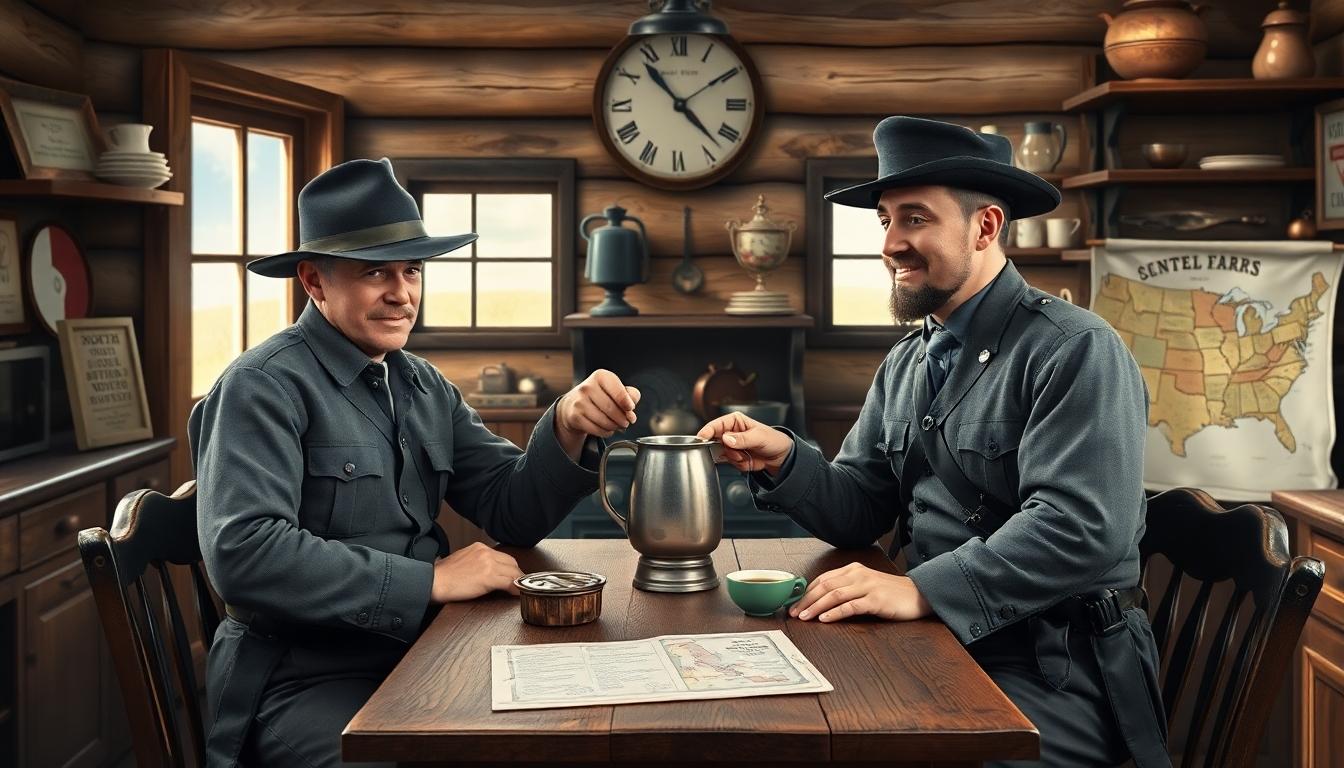
When tensions ran high during America’s most divisive conflict, humor provided much-needed relief. Let’s explore some of the lighter moments that emerged from this challenging period.
North vs. South Sitcom Scenarios
Imagine tuning into a Civil War-era sitcom where misunderstandings between North and South create comedy gold! The classic “Lost Recipe” scenario would feature Union and Confederate families locked in a hilarious feud over who truly owns a prized secret family dish. Recipes became battlegrounds of their own as each side claimed culinary superiority. Another popular sitcom plot revolves around “The Great Coffee Heist,” where a series of comical mishaps unfold when soldiers attempt to switch coffee beans between Northern and Southern camps. Coffee was serious business during the war, with both sides debating whose brew reigned supreme. These fictional scenarios capture the essence of divided America through a humorous lens, highlighting how everyday situations could become comedic fodder against the backdrop of national conflict.
State Rivalry Jokes
State rivalries during the Civil War spawned a unique brand of regional humor that continues to resonate today. Northern versus Southern hospitality became a frequent punchline, with jokes exaggerating the contrast between Southern charm and Northern efficiency. “A Virginian will welcome you with open arms while a New Yorker will welcome you with open schedules” was a common quip of the era. State slogans provided fertile ground for Civil War humor, with playful adaptations like “Virginia is for Lovers of Secession” circulating among troops. These state-based jokes often focused on regional stereotypes, climate differences, and cultural peculiarities. Soldiers from different states frequently engaged in good-natured ribbing, creating bonds through shared laughter even as they represented opposing sides of the conflict. Regional identity became both a source of pride and humor as Americans navigated their divided nation through wit and wordplay.
History Class Humor: Civil War Edition
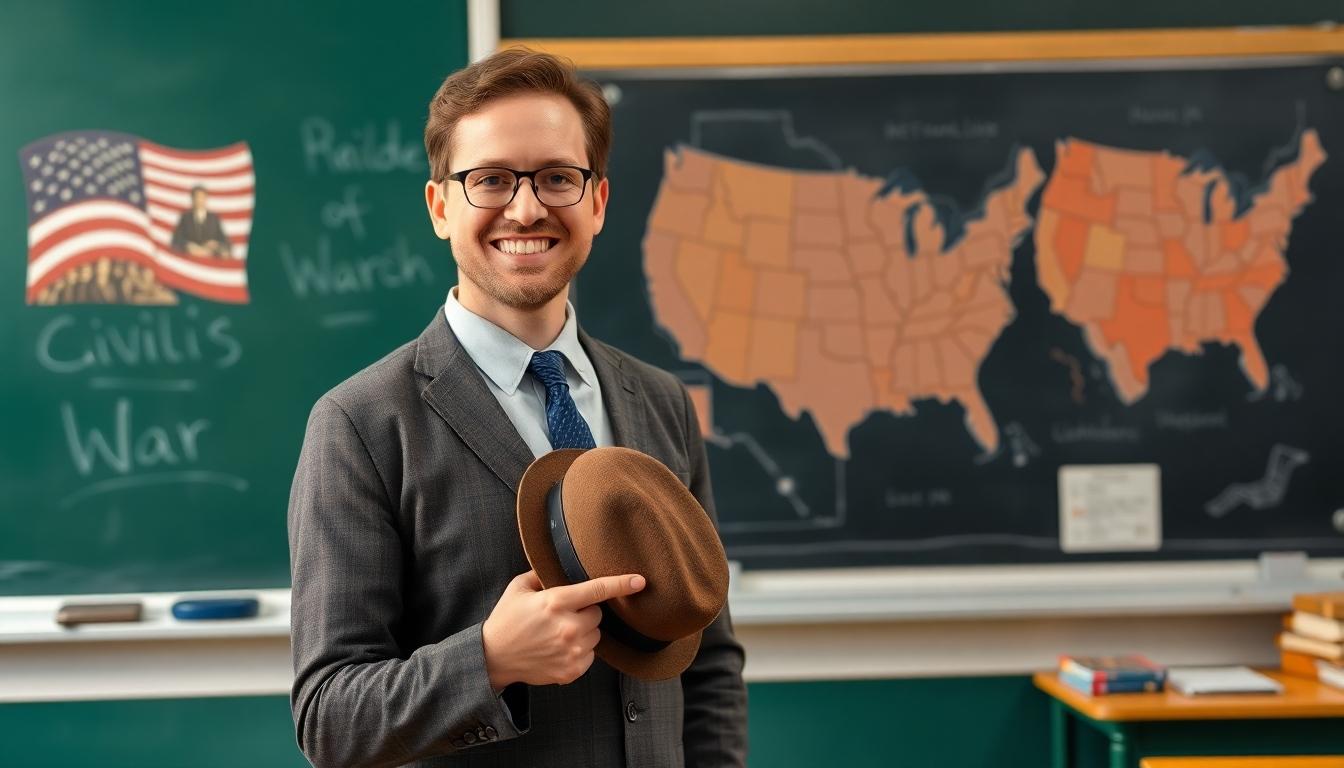
Even the most serious history lessons can benefit from a touch of humor. Civil War jokes have found their way into classrooms across America, helping students connect with this pivotal historical period through laughter.
Textbook Ticklers
Civil War humor often relied on clever wordplay and situational irony that still resonates in modern classrooms. Soldiers reportedly carried pencils “to draw their weapons,” creating a brilliant pun on “draw” as both sketching and unsheathing a weapon. Another classic joke involves soldiers’ favorite clothing being a “Union suit,” which plays on “union” referring to both undergarments and the Northern states. Military strategy wasn’t exempt from humor either, with the Union’s approach humorously described as “divide, conquer, and complain about the weather.” These witty expressions showcase how even in history’s darkest moments, humor provided necessary relief and perspective on the battlefield.
Teacher-Approved Puns
Many Civil War jokes that survived in newspapers from 1861-1865 reveal humor exact to that era, though some require historical context to fully appreciate. For instance, references to “Iron Horses” would have been immediately recognized as steam locomotives by people of that time. Modern history teachers have adapted these classics for today’s students with jokes like a cannonball lamenting, “I’m tired of destruction—can’t I join a bowling league?” Beverage humor was also popular, with imagined arguments between Union and Confederate soldiers over coffee, calling it “victory in a cup.” Cultural commentary emerges in jokes like tour guides insisting “On my tour, the South will always win”—drawing parallels to modern “alternative facts.” Military mishaps provide fertile ground for humor, such as a Confederate soldier who “seceded too soon” in a race. Generals arguing over food supposedly sparked a “beef history,” demonstrating how anachronistic humor helps make historical figures more relatable to today’s students.
Keeping History Alive Through Humor: Why Civil War Jokes Matter
Civil War humor reminds us that even in America’s darkest hour people found ways to smile. These jokes don’t diminish the war’s significance but rather humanize those who lived through it. From Lincoln’s strategic storytelling to soldiers’ battlefield banter we’ve seen how humor served as both coping mechanism and community builder.
Today these jokes offer us a unique connection to the past. They make history approachable and memorable while encouraging deeper exploration of this pivotal era. Whether in classrooms reenactments or casual conversation Civil War humor continues to bridge the gap between centuries.
So next time you share a Civil War pun remember you’re part of a long tradition that keeps history vibrant relevant and yes even funny. After all sometimes laughter truly is the best teacher.
Frequently Asked Questions
Why is there humor about the Civil War when it was such a tragic event?
Humor about the Civil War serves as both a coping mechanism and educational tool. During the war itself, soldiers used jokes to maintain morale and build camaraderie amid difficult circumstances. Today, respectful humor helps make history more accessible and engaging, particularly for students learning about this complex period. The key is ensuring jokes maintain respect for the historical significance while helping people connect with the past in a memorable way.
Did Abraham Lincoln really tell jokes during the Civil War?
Yes, Lincoln was well-known for his wit and humor. Rather than quick one-liners, he typically used strategic storytelling with accessible metaphors to explain complex political issues. His self-deprecating humor and clever wordplay helped him connect with people across different backgrounds, outmaneuver political rivals, and maintain perspective during America’s darkest chapter. Lincoln’s humorous approach was an integral part of his leadership style.
What kinds of jokes did Civil War soldiers actually tell?
Civil War soldiers shared jokes about military life, regional differences, and shared hardships. They used puns about “drawing” weapons, anthropomorphized cannons, made light of equipment failures, and joked about camp conditions. The “Great Coffee Debate” between Union and Confederate troops became a source of humor. These jokes appeared in Civil War-era newspapers and personal letters, providing essential psychological relief while fostering camaraderie among soldiers.
How do Civil War reenactors use humor today?
Modern reenactors embrace period-appropriate humor while adding their own comedic touches. They joke about the challenges of wearing authentic uniforms, camp life mishaps, and accidental anachronisms. Good-natured rivalries between “Yankees” and “Rebels” continue with playful banter and situational comedy. Reenactors use humor to build community, engage audiences, and make history more accessible while still honoring the historical significance of the events they portray.
Can Civil War humor be used in educational settings?
Absolutely! Teacher-approved Civil War jokes and puns have become valuable educational tools in classrooms. Humor helps students connect emotionally with historical events, making the material more memorable and engaging. Clever wordplay and historically-based jokes create relatable entry points to more serious discussions about the war’s causes and consequences. When used thoughtfully, humor can transform potentially dry historical content into something students genuinely enjoy learning about.
What’s the difference between appropriate and inappropriate Civil War humor?
Appropriate Civil War humor focuses on historical ironies, wordplay, and situational comedy without glorifying or trivializing suffering. It maintains respect for the war’s significance and the lives lost while finding gentle humor in human experiences and misunderstandings. Inappropriate humor, by contrast, mocks victims, glorifies violence, reinforces harmful stereotypes, or diminishes the war’s importance. The key distinction is whether the joke educates and humanizes history or disrespects its gravity.
Did generals and military leaders participate in the humor?
Yes, military leaders including Lincoln, Grant, and Lee were known for their distinctive humor styles. Lincoln used strategic storytelling, while Grant’s stoic demeanor became the subject of many jokes. Lee’s formal style inspired comedic parodies among soldiers. These leaders recognized humor’s value for morale and used it strategically. Their wit humanized them to their troops while providing psychological relief during intense wartime pressures.
How did newspapers use humor during the Civil War era?
Civil War newspapers frequently published jokes, cartoons, and humorous anecdotes as morale boosters. These publications recognized humor’s psychological importance during national trauma and provided comic relief amid war reporting. Newspapers from opposing sides often featured jokes at each other’s expense, reflecting regional rivalries. This humor served as both entertainment and subtle propaganda, reinforcing cultural identities while helping civilians and soldiers cope with the war’s harsh realities.

